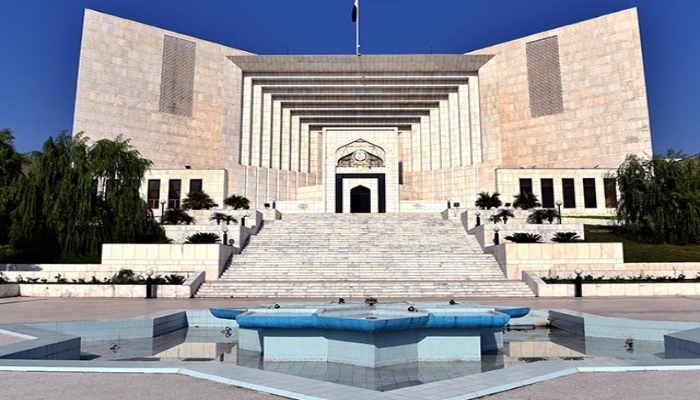ISLAMABAD: Chief Justice of Pakistan (CJP) Justice Umar Ata Bandial on Wednesday said loyalty is the basic principle of the constitution, adding that Article 63(A) has associated loyalty with the party policy on four occurrences.
A five-member larger bench of the Supreme Court headed by CJP Bandial and comprising Justice Muneeb Akhtar, Justice Ijaz ul Ahsan, Justice Mazhar Alam, and Justice Jamal Khan Mandokhel resumed hearing of the presidential reference seeking interpretation of Article 63(A) of the Constitution of Pakistan.
The lawyer representing Pakistan Peoples Party (PPP), Farooq H Naek, resumed his arguments and said Article 58-2(b) was abolished through 13th Amendment in 1997 but ex-president Musharraf restored it in 2002 through the LFO.
He said it was scrapped from the constitution again in 2010 through the 18th amendment.
The counsel said Article 63(A) was amended in the constitution through 14th amendment in which the party head was given wide powers.
Farooq H Naik argued that the election commission did not have the power to overturn the decision of the party chief.
He said Article 63(A) was amended again through a presidential order in 2002 and the powers of the party head were reduced.
The counsel said these powers were further reduced in the 18th amendment and the authority residing with the party chief was transferred to the head of the parliamentary party.
In the same amendment, Farooq H Naek said the election commission was authorized to decide on the reference filed under Article 63(A).
He said the duration of disqualification of a lawmaker has been provided in Article 63. The counsel argued that the presidential reference is not against Article 63(A) but its sub-clause 4.
Justice Ijaz ul Ahsan remarked that Article (62)(1)(f) did not expound the span of ineligibility and the top court interpreted it.
CJP remarked that Article 63(A) has associated loyalty with the party policy on four occurrences. He said loyalty is the basic principle of the constitution and disqualification is not a normal thing.
The court said the main purpose of Article 63(A) is to ensure loyalty to the party.
Read more: Presidential reference in Supreme Court: Deviation not just ‘awakening of conscience’
The bench remarked, “It is not necessary to look into Article (63)(A) only. We have to peruse the constitution collectively.”
Justice Muneeb Akhtar remarked that a party’s ticket holder swears his affiliation to the party. Justice Ijaz ul Ahsan said the ticket holders pledge to abide by the party policy and discipline in their nomination papers.
In response, Farooq H Naek said no candidate can be made a slave.
Justice Muneeb Akhtar said non-observance of the oath is dishonesty. “The one who deviates comes on the ticket of a political party,” he added.
Farooq H Naek said deviation from the party does not result in disqualification. PPP lawyer said that loyalty is only observed in a monarchy.
“Even if it is assumed that the member has been unfaithful, he will still be de-seated. Let the people decide who to choose,” he said.
At this Justice Ijaz ul Ahsan responded that Articles 62 and 63 should then be removed from the constitution.
The counsel reiterated that deviation does not lead to disqualification.
Justice Jamal Khan remarked that harsh punishment like disqualification could not be given without trial. He added that an independent candidate, who later joins a party, does not take an oath of allegiance to the party.
Concluding his arguments, Farooq H Naek said the dissenter can only be de-seated and then contest the by-election.
The hearing of the case was adjourned till Thursday.



















